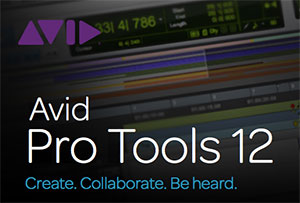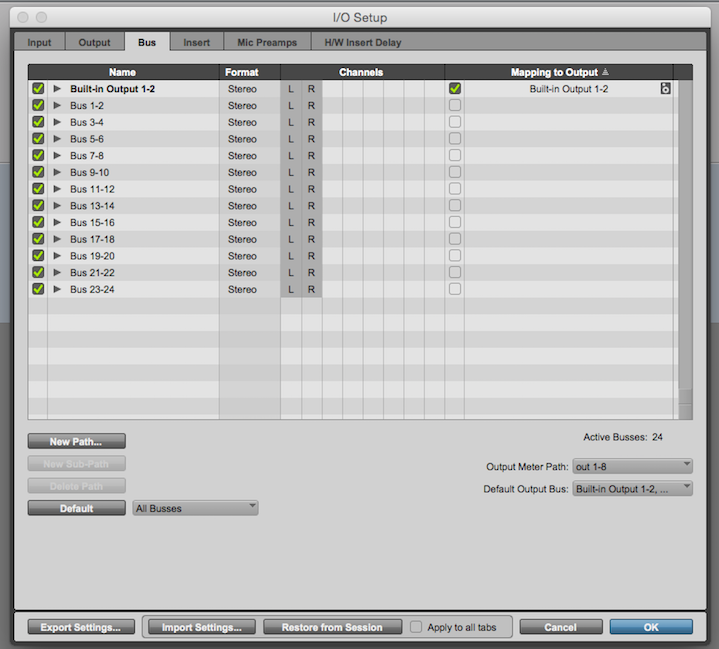The Pro Tools 12.4 update is a minor update relative to the Pro Tools 11 update which saw substantial change to the operating platform it was built upon (from 32 bit to 64 bit). Such a change had significant positive impact on the operating efficiencies of the DAW; but unfortunately, the Pro Tools 11 update also had significant impact on all users, forcing them to comply with updates of third party plug-ins, some of who were very slow to respond with the upgrades, despite having been provided a long lead time of several years from the manufacturers (Pro Tools and Logic Pro to name at least two). I for one was disappointed at how few, and how long it took many of the third party manufacturers to finalise their updates. Some to this day have still not upgraded, forcing me to sacrifice my investment in their product, and repurchase from alternative 64 bit providers.
However, as that was about twenty months ago, it is now time to welcome Pro Tools 12.
Changes with Pro Tools 12.4
The most exciting change from a Pro Tools’ user’s perspective is, Pro Tools 12.4 now allows:
-
128 tracks of audio and 512 instrument tracks (in Pro Tools 12 native)
-
track input monitoring (in Pro Tools 12 native)
-
advanced metering (in Pro Tools 12 native)
-
AFL/PFL solo mode option
-
MIDI to audio commit
However, there are more systemic changes in Pro Tools 12.4 – four levels of changes in fact – that can result in greater efficiencies for Pro Tool’s User’s.
The first level of changes include:
-
Pro Tools subscriptions
-
AVID apps manager
-
In application plug-in purchase
Pro Tools 12.4 comes with the option of purchasing or subscribing to Pro Tools in a variety of ways, to accommodate the user’s particular budget. Additionally, Pro Tools now offers a free light version for those aspiring Pro Tools users who either do not have the funds yet, or want to trial Pro Tools prior to purchasing it.
The AVID apps manager is a great innovation that allows for your Pro Tools application and your AVID based plug-ins to be automatically updated when you start up Pro Tools (providing you are connected to the internet). I have found that it is best to let the AVID apps manager complete its’ updates prior to beginning a session.
The in application plug-in purchase feature of Pro Tools 12.4 now allows you to purchase or rent AVID plug-ins, from within your DAW session.This is particularly useful when you are working with other Pro Tool’s users who send you their session to complete a task, but have used certain AVID plug-ins that you do not own. The in application plug-in purchase feature allows the user to navigate through the session drop down menus to rent or purchase the particular plug-in that your peer has included in the session, for the period you need it for.
The second level of changes include:
-
the use of templates for new sessions
-
new blank sessions
-
opening recent sessions
-
showing or hiding the dashboard on dashboard at start-up
The new dashboard window in Pro Tools 12 replaces the (up to Pro Tools 11) Quick Start window. Whilst it is similar to the Quick Start menu in function, the new layout has two tabs – Create and Recent.
The Create tab allows you to create a new Pro Tools session, with choice of creating a session from a template, or opening the a new blank session, selecting the session parameters that you are needed.
Some the template sessions include Blues, Drum and Bass and Dubstep.
Additionally, under the Recent tab, you can choose to open one of your recent sessions.
This dashboard window can be bypassed at start up by de-selecting it (check box in the bottom left-hand corner.
The third level of changes include:
-
metadata inspector window
The metadata inspector window allows you to update specific details regarding a Pro Tools’s session, such as the title, the artist’s name, contributors, and session location. Other information such as the sample rate, bit depth, date created, date modified and session bpm are also listed in this window, but can not be edited.
The fourth level of changes include a range of I/O Setup Improvements. These are:
-
changes to the output and Bus pages
-
unlimited Bus Paths
-
subpaths for output paths
-
downmix and upmix output busses to outputs
-
monitor path
-
session interchange and I/O mapping
-
using keyboard modifiers when enabling or assigning output busses
-
audition path improvements
-
AFL/PFL path improvements
-
restore from session
-
I/O Settings files automatically created and reconciled for different playback engine
-
organise track I/O menus by preference
-
importing I/O settings from session files
-
I/O setup setup in session notes





